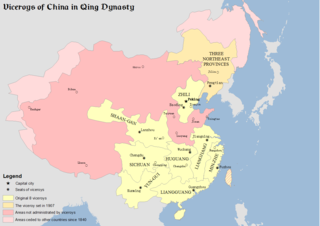| |||||
| Decades: | |||||
|---|---|---|---|---|---|
| See also: | Other events of 1857 History of China • Timeline • Years | ||||
Events from the year 1857 in China .
| |||||
| Decades: | |||||
|---|---|---|---|---|---|
| See also: | Other events of 1857 History of China • Timeline • Years | ||||
Events from the year 1857 in China .

The Xianfeng Emperor, also known by his temple name Emperor Wenzong of Qing, personal name Yizhu, was the eighth emperor of the Qing dynasty, and the seventh Qing emperor to rule over China proper, reigned from 1850 to 1861. During his reign, the Qing dynasty experienced several wars and rebellions including the Taiping Rebellion, Nian Rebellion, and Second Opium War. He was the last Chinese emperor to exercise sole power.

The Qianlong Emperor, also known by his temple name Emperor Gaozong of Qing, personal name Hongli, was the fifth emperor of the Qing and the fourth Qing emperor to rule over China proper. The fourth son of the Yongzheng Emperor, he reigned officially from 11 October 1735 to 8 February 1796. In 1796, he abdicated in favour of his son, the Jiaqing Emperor, out of filial piety towards his grandfather, the Kangxi Emperor, who ruled for 61 years, so that he not officially usurp him as the longest-reigning emperor. Despite his retirement, however, the Qianlong Emperor retained ultimate power as the Emperor Emeritus until his death in 1799, making him one of the longest-reigning monarchs in history as well as one of the longest-lived, having died at the age of 87. He was respected as the "Emperor Manjushri" (文殊皇帝) by Tibetans.

Emperor Jing of Han, personal name Liu Qi, was the sixth emperor of the Han dynasty of China from 157 to 141 BC. His reign saw the limiting of the power of the feudal kings/princes which resulted in the Rebellion of the Seven States in 154 BC. Emperor Jing managed to crush the revolt and princes were thereafter denied rights to appoint ministers for their fiefs. This move helped to consolidate central power which paved the way for the long reign of his son Emperor Wu of Han.

Wu Sangui, courtesy name Changbai (長白) or Changbo (長伯), was a notorious Ming dynasty military officer who played a key role in the fall of the Ming dynasty and the founding of the Qing dynasty in China. In Chinese folklore, Wu Sangui is regarded as a disreputable Han Chinese traitor who played a pivotal role in several historical events, including the Battle of Shanhai Pass, Qing conquest of Ming China, the suppression of Southern Ming resistances and the execution of the Yongli Emperor, and eventually double-crossed both of his masters, the Ming and the Qing dynasties.
The Chongzhen Emperor, personal name Zhu Youjian, courtesy name Deyue (德約), was the 17th and last emperor of the Ming dynasty. He reigned from 1627 to 1644. "Chongzhen", the era name of his reign, means "honorable and auspicious."

Zongdu, usually translated as Viceroy, Head of State or Governor-General, governed one territory or more provinces of China during the Ming and Qing dynasties.

The Emperor in Han Dynasty, also released under the title The Emperor Han Wu in some countries, is a 2005 Chinese historical drama television series based on the life of Emperor Wu of the Han dynasty. It uses the historical texts Records of the Grand Historian and Book of Han as its source material.

Li Xian, courtesy name Mingyun, formally Crown Prince Zhanghuai, named Li De from 675 to 680, was a crown prince of the Chinese Tang Dynasty. He was the sixth son of Emperor Gaozong, and the second son of his second wife Empress Wu. He was known for writing commentaries for the Book of Later Han, the official history of the Eastern Han Dynasty. He became crown prince in 675 after his older brother Li Hong's death, but soon fell out of favor and generosity with Empress Wu herself and that's what caused his downfall. In 680, Empress Wu had her associates accuse Li Xian of treason, and he was demoted to commoner rank and exiled. In 684, after Emperor Gaozong's death, Empress Wu, then empress dowager, had her associate Qiu Shenji (丘神勣) visit Li Xian to force him to commit suicide.
Lai Ji was Chinese military general and politician during the Tang dynasty, serving as a chancellor during the reign of Emperor Gaozong. He later offended Emperor Gaozong by opposing the ascension of Emperor Gaozong's second wife Empress Wu and was exiled to be a prefect in the extreme western part of the state. In 662, he died in battle while defending his prefecture against a Western Tujue attack. His brother Lai Heng also served as a chancellor during Emperor Gaozong's reign.
Jiangnan Daying or the Jiangnan Battalion; was an army group assembled by the Qing dynasty. The army group consist of mostly Green Standard Army, and their goal was to quell the Taiping Rebellion around the Jiangnan region. The army group twice encircled Nanjing, the capital of the Taiping Heavenly Kingdom, but were defeated by the Taiping forces on both occasions.

The Affaire in the Swing Age, also known as The Dynasty or Love Against Kingship, is a 2003 Chinese television series based on the novel Jiangshan Fengyu Qing by Zhu Sujin, who was also the screenwriter for the series. The series depicts the events in the transition of the Ming dynasty to the Qing dynasty in China, focusing on the lives of historical figures such as Li Zicheng, Wu Sangui, Chen Yuanyuan, the Chongzhen Emperor and Huangtaiji.
Events in the year 1900 in China.
Events from the year 1967 in China.
Events from the year 1856 in China.
Events from the year 1855 in China.
Events from the year 1854 in China.
Events from the year 1850 in China.
Events from the year 1845 in China.
Events from the year 1662 in China.